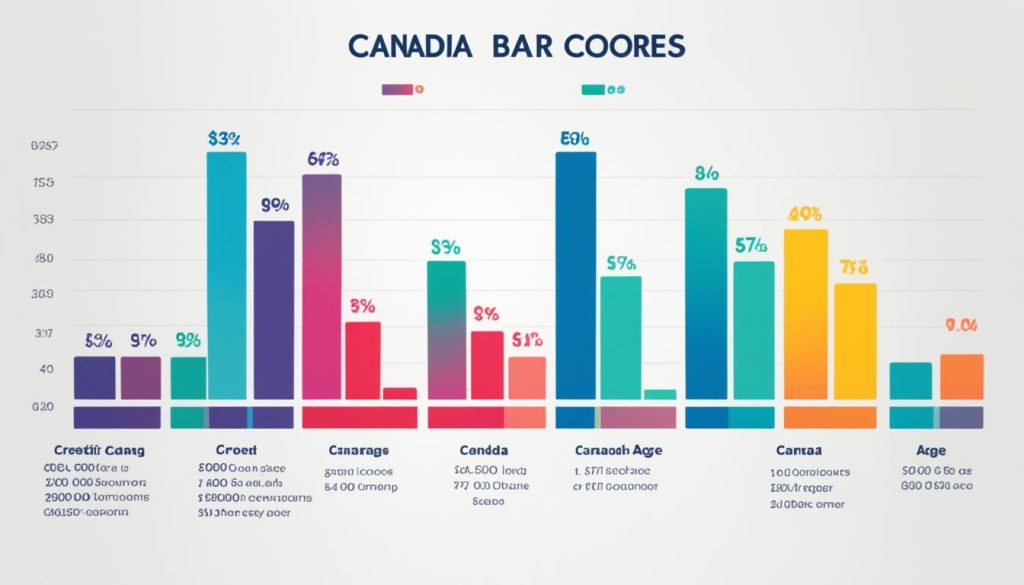In Canada, credit scores play a crucial role in financial decision-making. But did you know that the credit score range in Canada is from 300 to 900? This three-digit number has a significant impact on one’s financial opportunities and can determine whether you’re approved for loans, get competitive interest rates, or even secure a rental apartment. Understanding what constitutes a good credit score is essential for financial success. Let’s dive into the details and explore what makes a credit score good in Canada.
What is a Good Credit Score in Canada?
In Canada, a good credit score typically falls within the range of 660 to 724. Achieving a credit score in this range indicates responsible credit management and enhances your creditworthiness. A very good credit score ranges from 725 to 759, while an excellent score is 760 and above. Maintaining a good credit score opens doors to various financial opportunities, such as being approved for loans, securing competitive interest rates, and improving the likelihood of success in rental applications and potential employer assessments.
By understanding the factors that influence credit scores and following sound financial practices like making timely payments, managing credit utilization, and monitoring credit reports, individuals in Canada can work towards achieving and maintaining a good credit score, ultimately enhancing their financial stability and future prospects.
Factors Affecting Your Credit Score in Canada
Several factors play a crucial role in determining your credit score in Canada. Understanding these factors can help you take appropriate action to improve your creditworthiness and secure better financial opportunities.
1. Payment History
Your payment history is the most significant factor that influences your credit score, accounting for approximately 35% of it. Making timely and full payments is essential for maintaining a good payment history. By consistently paying your bills on time, you demonstrate responsible credit management and increase your creditworthiness.
2. Credit Utilization
Credit utilization measures the percentage of your total available credit that you’re using. It is advisable to keep your credit utilization below 35%. For example, if you have a total credit limit of $10,000, try to keep your total outstanding balance below $3,500. Keeping your credit utilization low shows that you’re managing your credit responsibly and can positively impact your credit score.
3. Credit History
Your credit history, which refers to the length of time you’ve had credit accounts, also plays a role in determining your credit score. It accounts for approximately 15% of your score. Having a longer credit history demonstrates stability and responsible credit management, which can boost your creditworthiness.
Types of Credit Used
The types of credit you use, such as credit cards and instalment loans, can also affect your credit score. Demonstrating a mix of credit types, such as having both revolving credit (e.g., credit cards) and instalment credit (e.g., a car loan), can show that you can manage different types of debts responsibly.
Credit Inquiries
The number of credit inquiries made within a specific period can impact your credit score. A hard inquiry occurs when you apply for new credit, and it can temporarily lower your score. It’s important to be cautious when applying for new credit and only do so when necessary.
Regularly monitoring your credit score through credit bureaus like Equifax and TransUnion can help you identify areas for improvement. By understanding the factors that influence your credit score, you can take proactive steps to improve your creditworthiness and achieve your financial goals.

Benefits of Having a Good Credit Score in Canada
Having a good credit score in Canada offers several benefits. Individuals with high credit scores are more likely to be approved for loans and credit, including mortgages, personal loans, credit cards, and car loans. They may also qualify for better loan rates and terms, which can result in lower interest payments and save money in the long run. A good credit score can also increase the possibility of renting an apartment and may even be considered by potential employers to assess financial responsibility.
While the average credit score in Canada varies, a score of at least 660 generally makes an individual eligible for various loans and credit cards. An 800 credit score is considered excellent and opens doors to more competitive rates and opportunities.
To better understand the benefits of a good credit score, let’s take a closer look at what it can get you:
1. Mortgage Approval
Having a good credit score is crucial when buying a house in Canada. A higher credit score demonstrates your ability to manage and repay debt, making you a more attractive candidate for mortgage lenders. While specific credit score requirements may vary among lenders, a good credit score significantly increases your chances of mortgage approval. It may even qualify you for more favourable terms and interest rates, ultimately helping you save money over the life of the loan.
2. Lower Interest Rates
With a good credit score, you’re more likely to qualify for lower interest rates on loans and credit cards. Lenders consider individuals with good credit scores as lower-risk borrowers and, therefore, offer them more competitive rates and terms. This can result in significant savings over time, especially for long-term loans like mortgages or car loans.
3. Increased Credit Limit
A high credit score can lead to a higher credit limit on your credit cards. Credit card companies are more willing to extend larger lines of credit to individuals they perceive as responsible and reliable borrowers. A higher credit limit provides you with greater financial flexibility and can be advantageous in emergencies or when making larger purchases.

Access to Premium Credit Cards and Rewards
Good credit scores qualify you for premium credit cards with additional perks and benefits. These cards often come with rewards programs, such as cashback, travel points, or exclusive discounts. These benefits can save you money and enhance your overall credit card experience.
Better Apartment Rental Opportunities
Landlords often review credit scores as part of the rental application process to assess financial responsibility and determine whether you’re a reliable tenant. A good credit score can improve your chances of securing a desirable apartment or rental property, especially in competitive rental markets.
| Credit Score Range | Rating |
|---|---|
| 660 – 724 | Good |
| 725 – 759 | Very Good |
| 760 and above | Excellent |
Source: Equifax and TransUnion
Tips for Improving Your Credit Score in Canada
Improving your credit score in Canada is not an overnight process, but with consistent effort and smart financial habits, you can see positive results over time. Here are some proven strategies to help you improve your credit score:
1. Establish a Credit History
To build a positive credit history, consider obtaining a credit card and using it responsibly. Make regular payments on time and in full to demonstrate your ability to manage credit effectively. This will contribute to a stronger credit score.
2. Pay Bills on Time
One of the most important factors impacting your credit score is your payment history. Make sure to pay all bills on time and in full. Late or missed payments can have a negative effect on your credit score.
3. Manage Credit Utilization
Keep your credit utilization below 35% of your available credit. High credit utilization can indicate financial instability and negatively affect your credit score. Consider paying off balances regularly and keeping your credit utilization ratio low.
4. Avoid Frequent Credit Applications
Each time you apply for credit, it results in a hard inquiry on your credit report. Multiple inquiries within a short period can lower your credit score. To minimize the impact, only apply for credit when necessary and space out your applications.
5. Keep Total Debt in Check
Managing your debt load is crucial for improving your credit score. Aim to reduce outstanding balances, pay down loans, and avoid accumulating excessive debt. Maintaining a low debt-to-income ratio demonstrates financial responsibility to credit bureaus.
6. Set up Pre-Authorized Payments
To ensure timely payments, consider setting up pre-authorized payments for your bills and credit accounts. This can help you avoid missed payments and late fees, resulting in a positive payment history and an improved credit score.
7. Monitor Your Credit Reports
Regularly monitor your credit reports from credit bureaus like Equifax and TransUnion. Carefully review the information to ensure its accuracy and address any discrepancies or incomplete details. Monitoring your reports allows you to detect and resolve any issues that may be affecting your credit score.
8. Understand the Importance of Credit Scores
Recognize that credit scores play a crucial role in various aspects of your financial life. A good credit score can help you qualify for loans, secure better interest rates, and open doors to other financial opportunities. By prioritizing your credit score, you can take control of your financial future.
By implementing these tips and maintaining responsible financial habits, you can steadily improve your credit score and enjoy the benefits that come with a strong credit rating.

Conclusion
Understanding credit scores is crucial for making informed financial decisions in Canada. Although achieving a perfect 900 credit score is rare, having a score above 800 is considered exceptional. However, with a credit score of 600, individuals may still be able to obtain certain loans, such as mortgages. It’s important to note that lenders may impose stricter requirements and offer less favourable terms in such cases.
Maintaining a good credit score requires responsible credit management, including making timely payments and paying attention to credit utilization. By actively monitoring credit scores, individuals can identify areas for improvement and work towards achieving a good credit score. This opens doors to better financial opportunities and enhances personal financial security.
When it comes to credit score requirements, it’s essential to remember that each lender and financial institution may have their own criteria. Therefore, staying vigilant and managing credit responsibly is vital for maintaining a high credit score. By understanding credit scores and making efforts to improve them, individuals can increase their chances of obtaining larger loans and enjoying better interest rates.
FAQ
What is a Good Credit Score in Canada?
A good credit score in Canada is typically between 660 and 724. A very good score falls between 725 and 759, and an excellent score is 760 and above.
What factors affect your credit score in Canada?
Several factors affect your credit score in Canada, including payment history, credit utilization, credit history, types of credit used, and the number of credit inquiries made.
What are the benefits of having a good credit score in Canada?
Having a good credit score in Canada can help you secure loans, obtain competitive interest rates, and even impact rental applications and job prospects.
How can I improve my credit score in Canada?
To improve your credit score in Canada, you can establish a credit history, pay bills on time and in full, avoid frequent credit applications, monitor your credit report, and address inaccuracies or incomplete information.
Can I get a perfect 900 credit score in Canada?
Achieving a perfect 900 credit score in Canada is rare, but a score above 800 is considered exceptional.




